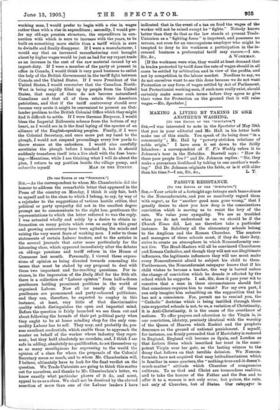[To THE EDITOR OP TEE"SPECTATOR. "] SIR,—As the correspondent to whom
Mr. Chamberlain did the honour to address the remarkable letter that appeared in the Press of the country on Monday, I think it only fair, both to myself and to the class to which I belong, to say, by way of a rejoinder to the suggestions of various hostile critics, that political or party sympathy did not in the smallest degree prompt me to communicate to the right hon. gentleman the representations to which the letter referred to was the reply. I was actuated wholly and solely by a desire to obtain in- formation on many points which even so early in this great and growing controversy have been agitating the minds and raising the very worst fears of working men. I refer to those statements of certain Labour leaders, and to the articles in the several journals that cater more particularly for the labouring class, which appeared immediately after the debates on old-age pensions and tariff reform in the House of Commons last month. Personally, I viewed these expres- sions of opinion as being directed towards concealing the issues that must be staked by any proposal to deal with these two important and far-reaching questions. For in- stance, in the impression of the Daily Mail for the 30th ult. there is a collection of "Labour opinion" from half-a-dozen gentlemen holding prominent positions in the world of organised Labour. Now all (or nearly all) of these gentlemen are pronounced and party-coloured politicians, and they can, therefore, be expected to employ in this instance, at least, very little of that discriminative quality which distinguishes the open and impartial mind. Before the question is fairly launched we see them out and about following the hounds of their pet political party when they ought to be at home minding shop for the only com- modity Labour has to sell. They may, and probably do, pos- sess excellent credentials, which enable them to approach the master on behalf of the worker whose industry they repre- sent ; but they bold absolutely no mandate, and, I think I am safe in adding, absolutely no qualification, to set themselves up as so many mouthpieces for expressing to the world the opinion of a class for whom the proposals of the Colonial Secretary mean so much, and to whom Mr. Chamberlain will, Ibelieve, ultimately have to look for the final verdict on the question. We Trade-Unionists are going to think this matter out for ourselves, and thanks to Mr. Chamberlain's letter, we know exactly what particular phases of it do, and must, appeal to us as a class. We shall not be deceived by the absnrd assertion of more than one of the Labour leaders I have
indicated that in the event of a tax on food the wages of the worker will not be raised except he " fights." Nobody knows better than they do that as the law stands at present Trade- Unionism as a "fighting force" is impotent, and possesses no terrors, not even for an unscrupulous employer who might be tempted to deny to his workmen a participation in the in- creased business a preferential tariff may ensure.—I am, [If the workmen were wise, they would at least demand that in trades protected by tariff dues the rate of wages should in all cases be settled by arbitration and in view of the profits, and not by competition in the labour market. Needless to say, we do not ourselves want to see this done because we do not want Protection or any form of wages settled by Act of Parliament, but Protectionist working men, if such men really exist, should certainly make some such terms before they agree to give their votes for Protection on the ground that it will raise wages.—En. Spectator.]










































 Previous page
Previous page